Best Paper Prizes
Each year ARCOM awards a number of sponsored prizes for best papers. This is an important recognition of the hard work the delegates have put into conducting much interesting research and developing the papers that publish those efforts. The awards all enjoy a £250 prize (or equivalent) together with the certificate that honours the award.
ARCOM has a number of commemorative awards we give annually on surveying/project management (Paul Townsend Commemorative Award), innovation (Rod Howes Commemorative Award) and social impact/significance (David Langford Commemorative Award). The past members of our community ARCOM commemorates each made a significant contribution to the field.
Paul Townsend was a strong supporter of ARCOM and an industry representative on the ARCOM committee for many years. He became an academic at Sheffield Hallam later in his career. The ARCOM award was instituted to celebrate his contribution following his untimely death.
Rob Howes is one of the founders of ARCOM and our first chairman, a charming and eloquent man, who was one of the key members in our community for many years.
David Langford, ARCOM’s Honorary Life President, sadly passed away in 2010. He led many of the ARCOM’s activities especially in the 1980s and 1990s.
The professional institutions (CIOB and RICS) and publishers associated with ARCOM (Wiley Blackwell, Taylor and Francis and Emerald) also award prizes at the conference. Themes for these prizes include the best international paper, innovation and sustainability, best technical paper, best theoretically informed contribution, and research methodology.
Click on the links below to view the prize winners for each year.
- 2025
- 2024
- 2023
- 2022
- 2021
- 2020
- 2019
- 2018
- 2017
- 2016
- 2015
- 2014
- 2013
- 2012
RICS Best Paper on Sustainability
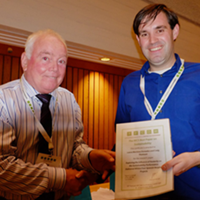 Laura Martinez Fernadez and Craig Thomson – “Exploring the Influence of Austerity on the Sustainability Performance Delivered Within Four Spanish Hospital Projects”
Laura Martinez Fernadez and Craig Thomson – “Exploring the Influence of Austerity on the Sustainability Performance Delivered Within Four Spanish Hospital Projects”The economic recession in Spain (2008-2012) has resulted in a period of unprecedented austerity as the Government attempted to align with the requirements of EC financial aid. Budgets for new hospital projects were significantly reduced and many on-going projects forced to adjust their initial proposals to fit with the new economics. Analysis revealed that sustainable measures which were regulated by legislation and those which have been proven to achieve an economic benefit over the building’s lifecycle have been retained and implemented despite the budget cuts.
Paul Townsend Commemorative Award
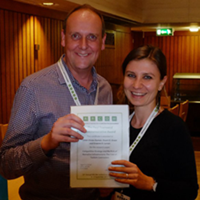 Dilek Ulutas Duman, Stuart D. Green and Graeme D. Larsen – “Competitive Strategy and the Role of Narrative Infrastructure: The Case of Turkish Contractors”
Dilek Ulutas Duman, Stuart D. Green and Graeme D. Larsen – “Competitive Strategy and the Role of Narrative Infrastructure: The Case of Turkish Contractors”This paper is about competitive strategy in the international construction sector. Drawing on the ‘narrative turn’ in organisation studies, it emphasises the temporal and discursively constructed nature of competitive strategy. The findings highlight the multi-actor and multi-level processes of strategy making. They further illustrate the way in which narrative building blocks that are continuously mobilized as part of the on-going progress of strategizing on the sectorial level.
David Langford Commemorative Award
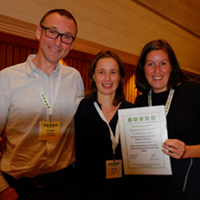 Lizet Kuitert, Leentje Volker and Marleen H. Hermans – “Public Commissioning in a New Era: Public Value Interests of Construction Clients”
Lizet Kuitert, Leentje Volker and Marleen H. Hermans – “Public Commissioning in a New Era: Public Value Interests of Construction Clients”In the construction industry public and semi-public clients increasingly depend on private parties to achieve project outcomes by subcontracting part of their activities using integrated contracts. Due to their social-political responsibilities, public bodies retain having a special role in ensuring public values. This paper presents preliminary results of a set of semi-structured interviews with different actors playing a part in commissioning of organisations with different degrees of publicness. Future research will examine governance mechanisms and frameworks to deal with identified experienced sector-specific conflicts.
CIOB Award for the Best International Paper
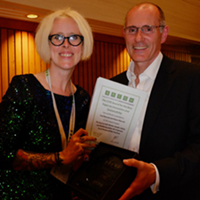 Fred Sherratt, Katie Welfare, Matt Hallowell and Marzia Hoque Tania – “Getting High on the Scaffolding? Construction Safety, Legalised Marijuana and Worker Impairment ”
Fred Sherratt, Katie Welfare, Matt Hallowell and Marzia Hoque Tania – “Getting High on the Scaffolding? Construction Safety, Legalised Marijuana and Worker Impairment ”Recreational drug use in construction is an area of concern as workers have a higher prevalence of such behaviours than those in other industries. The legalisation of marijuana in several US states has led to suggestions that this will result in increased use among workers. Here, a social constructionist methodology has been adopted, able to acknowledge the shift in cultural context caused by legalisation, and through discourse analysis a ‘non-event’ of legalisation was revealed. This could negatively influence the development of a ‘just culture’ on sites, and hinder worker engagement overall.
CIOB Award for the Best Paper on Innovation and Sustainability
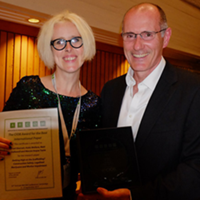 Fred Sherratt and Simon Sherratt – “The Road to Hell: Worker Health, Safety and Wellbeing within UK Corporate Social Responsibility Practices”
Fred Sherratt and Simon Sherratt – “The Road to Hell: Worker Health, Safety and Wellbeing within UK Corporate Social Responsibility Practices”Construction work is often unsafe, unhealthy and bad for worker wellbeing. In the UK governments and companies have sought to address this, the former through legislation the latter through their compliance, and more recently through Corporate Social Responsibility (CSR) remit. Contemporary CSR fails to acknowledge these characteristics of the capitalist system and instead, perhaps more dangerously, is contributing to the illusion that construction worker health, safety and wellbeing has never been better taken care of. This paper challenges this perhaps dangerous delusion.
Rod Howes Commemorative Award
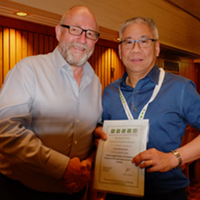 Toong Khuan Chan – “Global Supply Chains: A Preliminary Analysis of the Australian Construction Industry”
Toong Khuan Chan – “Global Supply Chains: A Preliminary Analysis of the Australian Construction Industry”Globalisation of the construction supply chain in Australia has led to an increasing number of products and services being procured by construction companies or their sub-contractors from manufacturers or suppliers overseas. This study aims to characterise the extent to which the Australian construction sector has embraced global supply chains, and to determine the drivers for the increase in imports.
Emerald Research Methodology Award
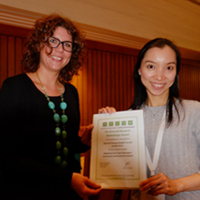 Clara M Cheung, Qingbin Cui and Jocelyn Davis – “Happiness for Project Managers: Framework and Empirical Analysis”
Clara M Cheung, Qingbin Cui and Jocelyn Davis – “Happiness for Project Managers: Framework and Empirical Analysis”In the past decade, organisations and governments have become increasingly interested in measuring how people feel, such as ‘Happy Planet Index’, ‘the Well-Being index’ and ‘Gross National Happiness’. To improve the levels of happiness, models were developed to examine antecedents of happiness; however, very few have focused on studying project managers (PMs). The results suggested a seven-factor PMs’ happiness model. In addition, work environment and meaningful work were found to be strong predictors of PM's happiness.
Taylor and Francis Award for the Most Theoretically-Informed Paper
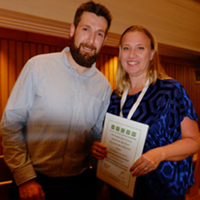 Ingrid Svensson and Pernilla Gluch – “The Role of Objects for Institutional Work in Energy Efficient Renovation”
Ingrid Svensson and Pernilla Gluch – “The Role of Objects for Institutional Work in Energy Efficient Renovation”Energy efficient renovation measures for public buildings implicates organizational change. Involved in the processes of change are both humans and objects. Studies on institutional work has hitherto mainly focused on human actors as agents for change, thus taken less consideration in objects’ role. In this paper, a sociomateriality lens is applied with the aim to increase the understandings of objects’ role for institutional work in energy efficient renovation.
Best Technical Paper
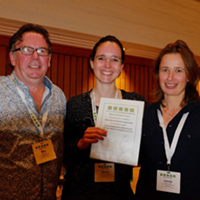 Marina Bos-de Vos and Leentje Volker – “Constructing Business Models around Identity: Tensions in Architectural Firms”
Marina Bos-de Vos and Leentje Volker – “Constructing Business Models around Identity: Tensions in Architectural Firms”Architectural firms experience difficulties to establish healthy and sustainable business models as they must reconcile the often-competing value systems that they are based upon. Organizational members continuously negotiate professional values and beliefs with the firm's commercial goals, resulting in identity-strategy struggles. The research contributes to the literature on strategic management of architectural firms by articulating how professional aspects of identity enable and constrain practitioners to shape and be shaped by their strategic actions and decisions.